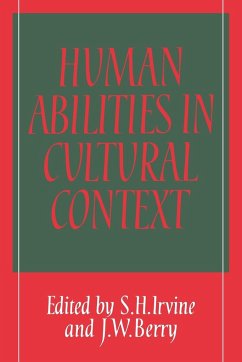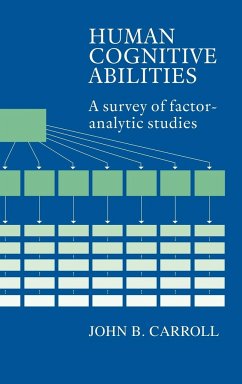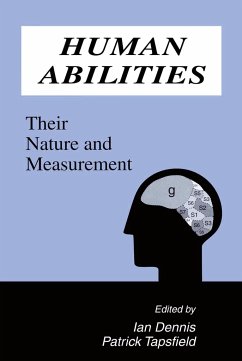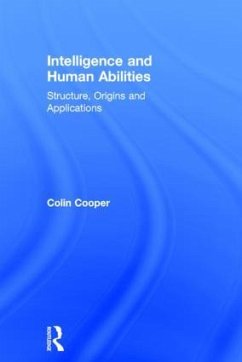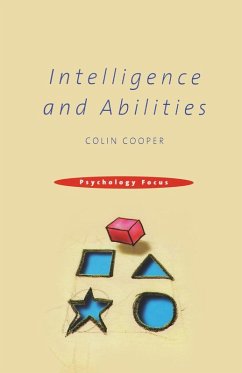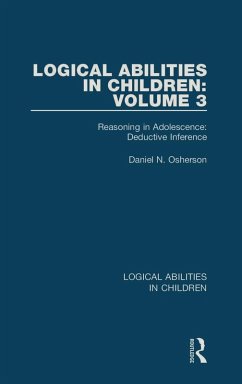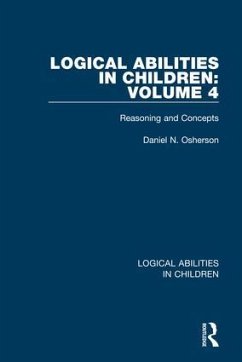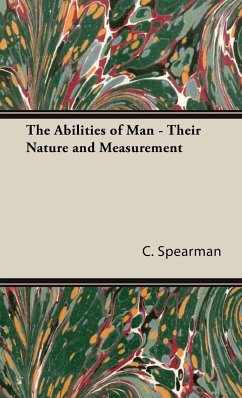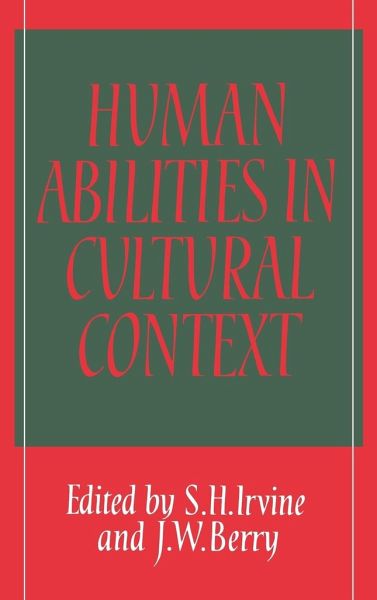
Human Abilities in Cultural Context
Versandkostenfrei!
Versandfertig in 1-2 Wochen
175,99 €
inkl. MwSt.

PAYBACK Punkte
88 °P sammeln!
Human Abilities in Cultural Context constitutes a major new reference frame for conceptualizing and studying human abilities. It is a unique contribution. Part I offers a reevaluation of ability theory by the editors, S. H. Irvine and J. W. Berry, and strong individual statements by H. J. Eysenck, Arthur R. Jensen, Joseph R. Royce, and Robert J. Sternberg, who represent markedly different approaches to the measurement of intelligence. Part II reviews various regional and national empirical studies in Britain, Norway, Turkey, Australia, China, Japan, SOuthern Africa, and North America. Part III...
Human Abilities in Cultural Context constitutes a major new reference frame for conceptualizing and studying human abilities. It is a unique contribution. Part I offers a reevaluation of ability theory by the editors, S. H. Irvine and J. W. Berry, and strong individual statements by H. J. Eysenck, Arthur R. Jensen, Joseph R. Royce, and Robert J. Sternberg, who represent markedly different approaches to the measurement of intelligence. Part II reviews various regional and national empirical studies in Britain, Norway, Turkey, Australia, China, Japan, SOuthern Africa, and North America. Part III focuses on contexts in which the limits of assessment by psychological tests are defined: in minority native groups in North America, in migrants to Britain, in lower-caste enclaves in India, among African minorities, and among Australian Aborigines. Written by long-term residents of the regions in question, these chapters present a wealth of new data that has been ignored in Western formulations of theory and practice. After five years of editorial labor, Irvine and Berry have issued one of the best-informed, most sustained scientific challenges to conventional wisdom about the nature of mental abilities and the conditions that foster their development in decades - a challenge to which psychologists and educators must respond.
Table of contents:
Preface; Acknowledgments; Part I. Human Abilities in Theoretical Cultures: 1. The abilities of mankind: a revaluation S. H. Irvine and J. W. Berry; 2. A triatchic view of intelligence in cross-cultural perspective Robert J. Sternberg; 3. The biological basis of intelligence H. J. Eysenck; 4. Speed of information processing and population differences Arthur R. Jensen; 5. The factor model as a theoretical basis for individual differences Joseph R. Royce; 6. The meaning of item bias in ability tests Ype H. Poortinga and Henk van der Flier; Part II. Cultural Responses to Ability Measurement: 7. The British 'cultural influence' on ability testing Paul Kline; 8. Cultural influences on patterns of abilities in North America Philip Anthony Vernon, Douglas N. Jackson and Samuel Messick; 9. Human abilities in the Eastern Mediterranean Cigdem Kagitcibasi and Isik Savasir; 10. The Norwegian tests and measuremtns in cultural context Knut A. Hagtvet and Johan O. Undheim; 11. Human assessment in Australia Daphne M. Keats and John A. Keats; 12. Test performance of blacks in Southern Africa I. M. Kendall, Mary Ann Vester and J. W. Von Mollendorf; 13. Individual differences among the peoples of china J. W. C. Chan and Philip E. Vernon; 14. japanese abilities and achievements Saburo Iwawaki and Philip E. Vernon; Part III. Cultural Limits Upon Human Assessment: 15. Native North Americans: Indian and inuit abilities Damian McShane and J. W. Berry; 16. Aboriginal cognition and psychological nescience L. Z. Klich; 17. Testing Bushmen in the Central Kalahari Helmut Reuning; 18. Caste and cognitive processes J. P. Das and Amulya Kanti Satpathy Khurana; 19. Educational adaptation and achievement of ethnic minority adolescents in Britain Gajendra K. Verma; 20. The diminishing test performance gap between English speakers and Afrikaans speakers in South Africa J. M. Verster and R. J. Prinsloo; Author index; Subject index.
Table of contents:
Preface; Acknowledgments; Part I. Human Abilities in Theoretical Cultures: 1. The abilities of mankind: a revaluation S. H. Irvine and J. W. Berry; 2. A triatchic view of intelligence in cross-cultural perspective Robert J. Sternberg; 3. The biological basis of intelligence H. J. Eysenck; 4. Speed of information processing and population differences Arthur R. Jensen; 5. The factor model as a theoretical basis for individual differences Joseph R. Royce; 6. The meaning of item bias in ability tests Ype H. Poortinga and Henk van der Flier; Part II. Cultural Responses to Ability Measurement: 7. The British 'cultural influence' on ability testing Paul Kline; 8. Cultural influences on patterns of abilities in North America Philip Anthony Vernon, Douglas N. Jackson and Samuel Messick; 9. Human abilities in the Eastern Mediterranean Cigdem Kagitcibasi and Isik Savasir; 10. The Norwegian tests and measuremtns in cultural context Knut A. Hagtvet and Johan O. Undheim; 11. Human assessment in Australia Daphne M. Keats and John A. Keats; 12. Test performance of blacks in Southern Africa I. M. Kendall, Mary Ann Vester and J. W. Von Mollendorf; 13. Individual differences among the peoples of china J. W. C. Chan and Philip E. Vernon; 14. japanese abilities and achievements Saburo Iwawaki and Philip E. Vernon; Part III. Cultural Limits Upon Human Assessment: 15. Native North Americans: Indian and inuit abilities Damian McShane and J. W. Berry; 16. Aboriginal cognition and psychological nescience L. Z. Klich; 17. Testing Bushmen in the Central Kalahari Helmut Reuning; 18. Caste and cognitive processes J. P. Das and Amulya Kanti Satpathy Khurana; 19. Educational adaptation and achievement of ethnic minority adolescents in Britain Gajendra K. Verma; 20. The diminishing test performance gap between English speakers and Afrikaans speakers in South Africa J. M. Verster and R. J. Prinsloo; Author index; Subject index.





